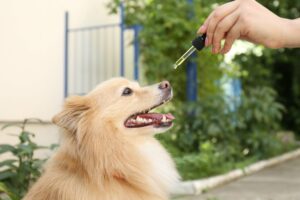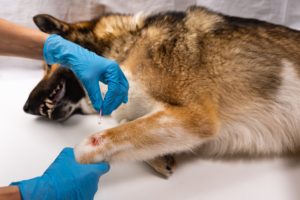Signs That Your Dog May Have Ringworm
 As a responsible dog owner, it is essential to be aware of the potential health issues that can affect your furry friend. One common condition that can impact dogs is ringworm. Despite its name, ringworm is not caused by a worm but rather by a fungal infection. It is highly contagious and can spread to humans as well. In this post, we will discuss the signs that your dog may have ringworm, allowing you to seek timely veterinary care and ensure the well-being of your beloved canine companion.
As a responsible dog owner, it is essential to be aware of the potential health issues that can affect your furry friend. One common condition that can impact dogs is ringworm. Despite its name, ringworm is not caused by a worm but rather by a fungal infection. It is highly contagious and can spread to humans as well. In this post, we will discuss the signs that your dog may have ringworm, allowing you to seek timely veterinary care and ensure the well-being of your beloved canine companion.
Sign #1: Hair Loss and Bald Patches
One of the most noticeable signs of ringworm in dogs is hair loss. You may observe bald patches or areas where the hair appears thin and brittle. The affected areas may be itchy, leading your dog to scratch or bite at them. Keep an eye out for any unusual changes in your dog’s coat, particularly if they are accompanied by redness or flakiness of the skin.
Sign #2: Circular or Irregular Lesions
Ringworm lesions typically have a distinctive appearance. They may present as circular patches with a red, raised outer edge and a clearer center, resembling a ring. However, it’s important to note that not all ringworm lesions look the same. Some may be irregularly shaped and lack the classic ring-like appearance. If you notice any skin abnormalities on your dog, consult your veterinarian for a proper diagnosis.
Sign #3: Itching and Scratching
Intense itching and scratching can be an indication of ringworm infection. The affected areas can be extremely irritating for your dog, leading them to scratch or lick excessively. This can exacerbate the condition and potentially cause secondary infections. If you observe your dog excessively grooming or scratching certain areas, it’s important to investigate further and seek veterinary advice.
Sign #4: Redness and Inflammation
Ringworm can cause redness and inflammation of the skin. You may notice that the affected areas appear redder than usual, accompanied by swelling or heat. In some cases, the skin may become cracked or scaly. These signs can vary in intensity depending on the severity of the infection and the individual dog. Regularly check your dog’s skin for any signs of redness or inflammation, particularly in areas where the hair is thin.
Sign #5: Dull and Brittle Coat
A healthy coat is a good indicator of a dog’s overall well-being. However, dogs with ringworm often develop a dull and brittle coat. The fungal infection affects the hair shafts, making the fur dry, fragile, and prone to breakage. If you notice a deterioration in your dog’s coat quality, it could be a red flag for ringworm or other underlying health issues.
Treatment for Canine Ringworm
Maintaining good hygiene and cleanliness, such as regular bathing, disinfecting pet bedding, and keeping living areas clean, can help prevent the spread of ringworm. Additionally, follow your veterinarian’s instructions regarding treatment, which may involve topical or oral antifungal medications, as well as isolating your infected pet from other animals until they are fully recovered.
By staying vigilant and seeking veterinary care at the first signs of ringworm infection, you can help ensure the well-being of your furry companion and minimize the impact of ringworm on your pet’s health and overall quality of life.
Think Your Dog Has Ringworm? Affordable Pet Hospital is Here to Help!
Recognizing the signs of ringworm in your dog is crucial for prompt diagnosis and treatment. Remember, ringworm is highly contagious, so early intervention is essential to prevent the infection from spreading to other pets or even to humans within the household. If you suspect your dog may have ringworm based on the signs mentioned above, consult your veterinarian for a proper diagnosis and appropriate treatment options. If you live in Tampa Bay, look no further than Affordable Pet Hospital on Cross Creek Boulevard in Tampa for all your veterinary care needs! Just give us a call at 813-991-9898 to set up an appointment today!

 For people, it is not uncommon for a medical doctor to recommend taking a multivitamin, along with other possible vitamins. So you may be wondering if this same advice would be beneficial to your pet. Just like with humans, there isn’t a one-size-fits-all answer. While vitamins may benefit some pets, they could harm others. Consulting with
For people, it is not uncommon for a medical doctor to recommend taking a multivitamin, along with other possible vitamins. So you may be wondering if this same advice would be beneficial to your pet. Just like with humans, there isn’t a one-size-fits-all answer. While vitamins may benefit some pets, they could harm others. Consulting with  Pet owners know their pets are prone to cuts, scrapes, and other wounds. However, the frequency with which these injuries occur might surprise you. Wounds can range from a shallow cut to a deep gash that exposes bone or even tendons. They can bleed profusely or not at all. They can be clean (no dirt or debris in the wound) or contaminated (soil, debris, bacteria on the wound). Depending on the extent of skin damage and contamination, wounds can heal quickly or require more extensive care and time to heal completely. In general, it’s always best to have veterinary advice when caring for your pet if you are unsure about anything related to your pet’s wound or its treatment. However, there are some general guidelines for wound care in dogs and cats that are good to know. Read on to learn how to manage your pet’s next cut, abrasion, or laceration so that it heals as quickly and thoroughly as possible.
Pet owners know their pets are prone to cuts, scrapes, and other wounds. However, the frequency with which these injuries occur might surprise you. Wounds can range from a shallow cut to a deep gash that exposes bone or even tendons. They can bleed profusely or not at all. They can be clean (no dirt or debris in the wound) or contaminated (soil, debris, bacteria on the wound). Depending on the extent of skin damage and contamination, wounds can heal quickly or require more extensive care and time to heal completely. In general, it’s always best to have veterinary advice when caring for your pet if you are unsure about anything related to your pet’s wound or its treatment. However, there are some general guidelines for wound care in dogs and cats that are good to know. Read on to learn how to manage your pet’s next cut, abrasion, or laceration so that it heals as quickly and thoroughly as possible. According to the Arthritis Foundation, around 20% of dogs have
According to the Arthritis Foundation, around 20% of dogs have  Puppy breath is adorable, but adult dog breath? Not so much. But even though your older dog’s breath might not smell like roses, it shouldn’t stink either. If it does, it could be a sign of bigger problems.
Puppy breath is adorable, but adult dog breath? Not so much. But even though your older dog’s breath might not smell like roses, it shouldn’t stink either. If it does, it could be a sign of bigger problems. Did you know that your pets can have seasonal allergies just like humans? Allergic rhinitis, also known as hay fever or seasonal allergies, is very prevalent in pets, especially dogs. Any dog can have these allergies, but they are especially prevalent in pit bulls, boxers, bichon frises, cocker spaniels, German shepherds, and Golden retrievers.
Did you know that your pets can have seasonal allergies just like humans? Allergic rhinitis, also known as hay fever or seasonal allergies, is very prevalent in pets, especially dogs. Any dog can have these allergies, but they are especially prevalent in pit bulls, boxers, bichon frises, cocker spaniels, German shepherds, and Golden retrievers. As a committed and compassionate pet owner, you want to do everything you can to keep your furry family members healthy and happy. One of the best ways to do this is to keep up with
As a committed and compassionate pet owner, you want to do everything you can to keep your furry family members healthy and happy. One of the best ways to do this is to keep up with 

 It’s that time of year again! The weather cools down and the outdoor decorating heats up as we approach Halloween, Thanksgiving, Hanukkah, Christmas, and Kwanzaa. With all the celebration and conversation, it’s easy to overlook common hazards to your pets around the holidays. Protect your furry loved ones this holiday season by keeping an eye on these top holiday hazards:
It’s that time of year again! The weather cools down and the outdoor decorating heats up as we approach Halloween, Thanksgiving, Hanukkah, Christmas, and Kwanzaa. With all the celebration and conversation, it’s easy to overlook common hazards to your pets around the holidays. Protect your furry loved ones this holiday season by keeping an eye on these top holiday hazards: